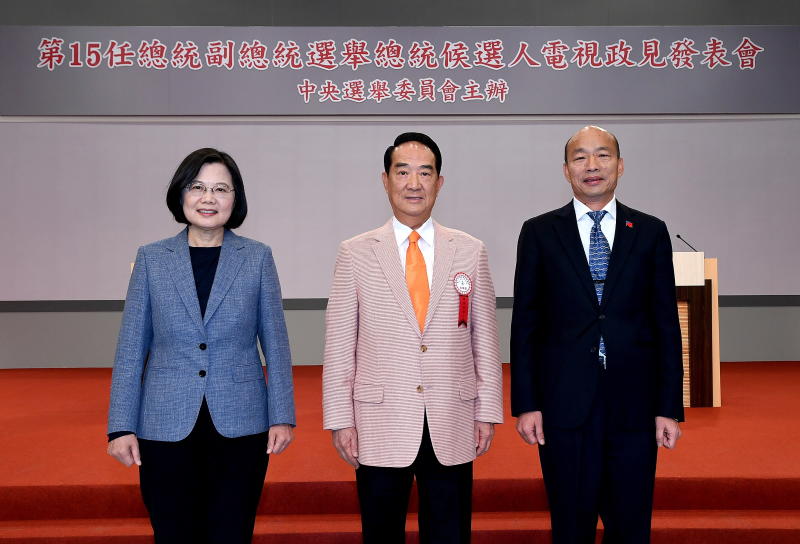Taiwan's presidential candidates all promise to protect island's democracy while debating cross-strait relations
Sign up now: Get ST's newsletters delivered to your inbox

(From left) Taiwan's presidential election candidates Tsai Ing-wen, James Soong Chu-yu and Han Kuo-yu pose for photographs before the first televised election debate in Taipei on Dec 18, 2019.
PHOTO: EPA-EFE
Katherine Wei
Follow topic:
TAIPEI - Taiwan's three presidential candidates did not hold back in criticising one other in the final televised debate before elections on Sunday (Dec 29), with many of the digs focusing on how the future administration might handle Taiwan-China relations.
The debate followed three policy presentations in the past two weeks. After a round of personal remarks from each of the candidates, editors from Taiwan's five major publications asked questions, with the candidates discussing how to interact with China, expand diplomatic ties, boost the economy, and deal with defence and sustainability.
Kaohsiung Mayor Han Kuo-yu said that if he was elected president, he would not abandon his supporters and planned to spend half of his time in the southern city. The presidential office is in Taipei.
The remarks come after many citizens signed a petition to begin a process to recall Mr Han from his position as mayor after he joined the presidential race.
Mr Han said he will protect (Taiwan's) sovereignty and its constitutional system and then spent much of his debate time slamming President Tsai Ing-wen's Democratic Progressive Party as the "biggest betrayer of Taiwan's sovereign rights".
He quoted Ms Tsai in saying that "One China is Taiwan's only path" in a speech given in 2000, a claim Ms Tsai later said needs solid fact-checking.
When asked by his opponents how he plans to protect Taiwan's de facto autonomy, Mr Han responded: "Why are we still discussing One Country, Two Systems?"
He maintains that he does not support the policy despite flip-flopping on the issue during his campaign.
People First Party chairman James Soong also pledged to protect Taiwan's rights and said that with him at the helm, Taiwan "will not be reduced to a pawn" in the face of major powers like the United States, China and Japan.
Mr Soong acknowledged the joint history and roots with China but said Taiwan has to better understand the mainland to pave way for clear communication without sacrificing its democracy. "We need constructive talks and to avoid provoking violence," he added.
Ms Tsai repeated the need for Taiwan to be a united front when it comes to China: "(The DPP) prioritises in preventing China from taking back Taiwan, but a divided Taiwan cannot handle China's infiltration and threats."
She also hit back at Mr Han, saying he has yet to provide solid policies that people can depend on.
"We need a president whose knees will not buckle at the mere mention of China," she continued, referencing how Mr Han refused to name China as Taiwan's main oppressor when asked publicly by local stand-up comedian Brian Tseng.
Ms Tsai's two opponents questioned how her government has all but cut off communication with China, something she denied: "We don't provoke China, nor did we actively stop communication; it is China who has stopped tourists from coming to Taiwan."
Ms Tsai also quoted a letter from a Hong Kong citizen, who implored the Taiwanese people to not "cave in to China's threats".
Mr Han has openly disapproved of the president's support of Hong Kong's protesters, calling her a liar who did nothing to help the former British colony.
"Every Taiwanese citizen has a bomb around their neck, the controller in Tsai's hand... She's using Hong Kong's anti-extradition protests and Taiwan's anti-infiltration bill to threaten people to vote for her," he said.
Mr Han also maintained that Ms Tsai and her government has "bought the loyalty of local media and enlisted an 'online army' as a part of a huge smear campaign," and accused Apple Daily of participating in the scheme.
Ms Tsai responded by talking about how China has been infiltrating Taiwan's elections, and credits China's netizens and bots as the biggest help in getting Mr Han elected.
She also called upon the other candidates to recognise how politicians have been targets of online bullying as a result.
Both Mr Han and Mr Soong criticised the DPP's insistence on passing the controversial anti-infiltration bill, which prevents other countries - namely China - from interfering with Taiwan's elections.
Mr Tseng Chien-yuan, a visiting communications scholar at Taiwan's National Chung Cheng University, praised Mr Soong and Ms Tsai's performance in the debate.
"They were both calm and displayed their rich experiences and knowledge in Taiwan's political history and current events, while Mayor Han is lacking in the same steadfastness," said Mr Tseng.
"I think they've all demonstrated their loyalty to Taiwan, but when it comes to Mayor Han, we need to know if he has the determination to defend Taiwan when he faces heavy pressure from China."

